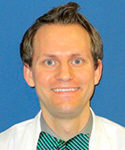August 22nd, 2016
First Week On Service
Joseph Cooper, MD

Joseph Cooper, MD, is a Chief Resident in Internal Medicine at Geisinger Medical Center in Danville, Pennsylvania.
“Medicine Purple is now rounding at Room 202.” The announcement rang throughout the hallways on the lower pavilion. It was an announcement I had heard many times before, but this time it was quite different. As I glanced in the upper right hand corner of the electronic medical record of my first patient, the following glared back at me in all capital letters: “ATTENDING: COOPER, JOSEPH DAVID.” I had imagined the transition from resident to attending would be quite easy. I was in for a shock.
The first month of my chief residency had been primarily administrative, and I found myself becoming more frustrated and going home upset and with a short fuse at times. But not in my wildest dreams could I have imagined the responsibilities surrounding the role of being the Attending Physician of record. Everyone looks to you for answers: my team, including medical students, interns, residents, pharmacists, nurses, and ancillary staff, and, most importantly, patients and their families.
But this week — my first week on service — reaffirmed my passion for clinical care and my ultimate goal to become a clinician-educator. At first, I was unsure about my teaching abilities. But teaching, whether formal or informal, occurs at all levels of training, and I threw myself into it. I was surprised to find that I could deduce out how much or how little my team knew by simply asking questions and waiting. Ask the medical students first, and if they don’t know, move up to the interns, then the residents. I reminded myself to ask in a nonconfrontational style and engage every learner. Asking questions is an art rather than a skill and even the most experienced and knowledgeable clinician-educators can refine and improve upon it.
The highlight of my week on service actually occurred on day 1. An older gentleman with multiple comorbidities was admitted to the special care unit with septic shock secondary to gram-positive cocci bacteremia. He had progressively declined in the last few months secondary to vascular surgeries and postop complications. A family discussion was held after admission, and he was made a No Code (DNR). Throughout the night, his blood pressure became more tenuous, and his peripheral phenylephrine requirements continued to increase. The intern approached the patient and his family at bedside and explained the need for a central venous access to continue the higher doses of vasopressor medication. Neither the patient nor his family wanted any further invasive procedures, and they decided against the central venous catheter.
I arrived early in the next morning and sat down with the family and the patient. We talked about his previous occupation, what he did for fun, how many children he had, and even about his pets. The patient was ready. He said, “Doc, thank you for everything, but I want to be comfortable here with my family.” After my patient passed, his son had tears in his eyes. He pulled me aside and said, “I appreciate everything you did and the time you spent with my family and my dad. Thank you.” I was humbled and appreciative and couldn’t hold back my own tears.
As trainees, we forget sometimes about the human aspect of medicine and why we went into medicine in the first place. Throughout our training, we sometimes become blinded by money, prestige, burnout, and other extenuating factors and forget that, ultimately, we are here to take care of patients. And not only our patients themselves but also their families and close friends.
The next time you feel overworked, burned out, stressed, upset, or anxious on the job remember why you went into medicine in the first place. To help others. Sometimes we just need a simple reminder that this is one of the most exhilarating and gratifying careers in the world. Embrace it, love it, strive to improve, be human, be good to yourself and others. All in all, I have to say this has been a great “first week on service.”



